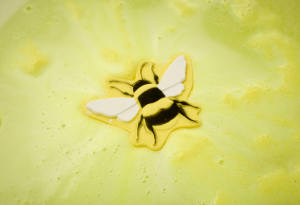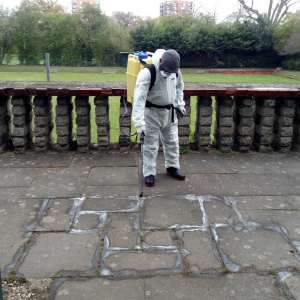
The Pollinators Bath Bomb

This limited edition bath bomb is helping to protect pollinators, people and the planet from the impacts of highly hazardous pesticides. By purchasing this sweet smelling product you are raising funds to support the ongoing campaign work of Pesticide Action Network UK (PAN UK), who are tackling the problems caused by pesticides like glyphosate.
Josie from PAN UK explains,
“We all have an important role to play in protecting our precious pollinators. By ditching glyphosate and other harmful chemicals in our gardens and urban public spaces, we can create thriving habitats where both people and wildlife can flourish.”
Available in the UK and Ireland only, this bee-autiful bath bomb launches on the Lush app on June 10th and in store and online on June 12th.
Lush Giving Products
Our Giving Products support human rights and social justice, animal rights and environmental protection by raising money for particular causes.
Find out more about the Giving Collection.

Pollinators
Pollinators are a diverse group of species including bees, wasps, butterflies, moths, flies and beetles that pollinate our food crops and wild plants and are critical to maintaining biodiversity and global food security. Some foods such as apples, pears, almonds, cashews, blueberries and chocolate are completely dependent on pollinators.
In the UK, a recent State of Nature report shows pollinating insects have decreased in distribution by 18% since 1970, and almost 50% of wild bees and hoverflies have declined since 1980. Globally, populations of pollinators are threatened by the use of harmful pesticides, habitat losses, climate change and pollution.
Pesticides
Pesticides are causing overwhelming negative effects on hundreds of species of microorganisms, plants, insects, fish, birds and mammals that they are not intended to harm, and globally their use is a major contributor to the biodiversity crisis.
Glyphosate is the world’s most widely used herbicide, popular with farmers and available for the public to buy in garden centres and even some supermarkets. It’s sold as an effective weedkiller, and more commonly known by its original trade name Roundup.
In 2015, the International Agency for Research on Cancer (IARC) labelled glyphosate as “probably carcinogenic” and studies have found that glyphosate-based herbicides can interfere with various organs and biochemical pathways in mammals.
Glyphosate based products have been shown to be toxic to bees and have adverse effects on earthworms and insects. Using glyphosate reduces plant and animal biodiversity as it kills the plants that provide habitats and food sources. When glyphosate enters the soil it reduces soil fertility by disrupting microbial balances and in rivers, lakes and oceans it has significant effects on aquatic organisms and ecosystems.

“Glyphosate has adverse effects on our health, water, soil and wildlife. Pesticides have no place on our pavements, parks and playgrounds, or in our gardens, but they continue to be widely used. It doesn’t have to be this way!”
Josie, PAN UK
Another way is possible
We can all take positive actions to reduce our reliance on harmful pesticides and support pollinators:
- Don’t use highly hazardous pesticides like glyphosate, and go pesticide-free in your garden (here’s a guide to get you started).
- Restore habitats and rewild to support pollinator populations. Plant more native and pollinator-friendly plants.
- Where possible shop organic, as organic farming methods use far fewer, less toxic pesticides and in much smaller amounts.
- Town and city councils and landowners can decide to ditch pesticides. Fifty UK councils are already pesticide-free, find out more here.
The UK and Ireland could follow the direction set by France, Denmark and Luxembourg where glyphosate cannot be used in public spaces. France has gone even further by banning all uses outside of farming, including by the public in their private gardens.
PAN UK and its partner PAN Europe are campaigning alongside others to seek a ban on urban and amateur (personal) use of glyphosate in the UK and Ireland, and eventually a total ban. In 2023, the European Commission granted a 10-year renewal of the EU licence for glyphosate, allowing its use in Ireland. In the UK the decision on whether to renew the license for glyphosate use is currently scheduled for December 2026. However, the recent EU-UK so-called ‘reset deal’ may mean that the UK adopts the European ten-year license. Watch this space!
Pesticide Action Network UK
PAN UK is a long running campaigning charity focused on tackling the problems caused by pesticides. They are part of a global network working to replace the use of highly hazardous pesticides with ecologically sound and socially just alternatives. They work tirelessly to apply pressure on governments, regulators, policy makers, industry and retailers to reduce the impacts of harmful pesticides to both human health and the environment.
Make an impact with this giving product
75% of the sales price (minus tax) from this bath bomb will be donated to Pesticide Action Network UK (PAN UK) to fund their ongoing work tackling the problems caused by pesticides like glyphosate.
Make an impact by purchasing a limited edition The Pollinators bath bomb today.
12:11




